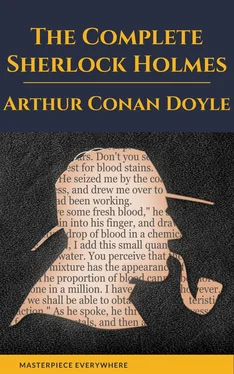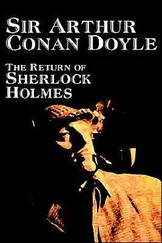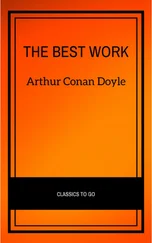"'Why, what on earth does this mean, John?' he stammered.
"My heart had turned to lead. 'It is K. K. K.,' said I.
"He looked inside the envelope. 'So it is,' he cried. 'Here are the very letters. But what is this written above them?'
"'Put the papers on the sundial,' I read, peeping over his shoulder.
"'What papers? What sundial?' he asked.
"'The sundial in the garden. There is no other,' said I; 'but the papers must be those that are destroyed.'
"'Pooh!' said he, gripping hard at his courage. 'We are in a civilised land here, and we can't have tomfoolery of this kind. Where does the thing come from?'
"'From Dundee,' I answered, glancing at the postmark.
"'Some preposterous practical joke,' said he. 'What have I to do with sundials and papers? I shall take no notice of such nonsense.'
"'I should certainly speak to the police,' I said.
"'And be laughed at for my pains. Nothing of the sort.'
"'Then let me do so?'
"'No, I forbid you. I won't have a fuss made about such nonsense.'
"It was in vain to argue with him, for he was a very obstinate man. I went about, however, with a heart which was full of forebodings.
"On the third day after the coming of the letter my father went from home to visit an old friend of his, Major Freebody, who is in command of one of the forts upon Portsdown Hill. I was glad that he should go, for it seemed to me that he was farther from danger when he was away from home. In that, however, I was in error. Upon the second day of his absence I received a telegram from the major, imploring me to come at once. My father had fallen over one of the deep chalk-pits which abound in the neighbourhood, and was lying senseless, with a shattered skull. I hurried to him, but he passed away without having ever recovered his consciousness. He had, as it appears, been returning from Fareham in the twilight, and as the country was unknown to him, and the chalk-pit unfenced, the jury had no hesitation in bringing in a verdict of 'death from accidental causes.' Carefully as I examined every fact connected with his death, I was unable to find anything which could suggest the idea of murder. There were no signs of violence, no footmarks, no robbery, no record of strangers having been seen upon the roads. And yet I need not tell you that my mind was far from at ease, and that I was well-nigh certain that some foul plot had been woven round him.
"In this sinister way I came into my inheritance. You will ask me why I did not dispose of it? I answer, because I was well convinced that our troubles were in some way dependent upon an incident in my uncle's life, and that the danger would be as pressing in one house as in another.
"It was in January, '85, that my poor father met his end, and two years and eight months have elapsed since then. During that time I have lived happily at Horsham, and I had begun to hope that this curse had passed away from the family, and that it had ended with the last generation. I had begun to take comfort too soon, however; yesterday morning the blow fell in the very shape in which it had come upon my father."
The young man took from his waistcoat a crumpled envelope, and turning to the table he shook out upon it five little dried orange pips.
"This is the envelope," he continued. "The postmark is London—eastern division. Within are the very words which were upon my father's last message: 'K. K. K.'; and then 'Put the papers on the sundial.'"
"What have you done?" asked Holmes.
"Nothing."
"Nothing?"
"To tell the truth"—he sank his face into his thin, white hands—"I have felt helpless. I have felt like one of those poor rabbits when the snake is writhing towards it. I seem to be in the grasp of some resistless, inexorable evil, which no foresight and no precautions can guard against."
"Tut! tut!" cried Sherlock Holmes. "You must act, man, or you are lost. Nothing but energy can save you. This is no time for despair."
"I have seen the police."
"Ah!"
"But they listened to my story with a smile. I am convinced that the inspector has formed the opinion that the letters are all practical jokes, and that the deaths of my relations were really accidents, as the jury stated, and were not to be connected with the warnings."
Holmes shook his clenched hands in the air. "Incredible imbecility!" he cried.
"They have, however, allowed me a policeman, who may remain in the house with me."
"Has he come with you to-night?"
"No. His orders were to stay in the house."
Again Holmes raved in the air.
"Why did you come to me," he cried, "and, above all, why did you not come at once?"
"I did not know. It was only to-day that I spoke to Major Prendergast about my troubles and was advised by him to come to you."
"It is really two days since you had the letter. We should have acted before this. You have no further evidence, I suppose, than that which you have placed before us—no suggestive detail which might help us?"
"There is one thing," said John Openshaw. He rummaged in his coat pocket, and, drawing out a piece of discoloured, blue-tinted paper, he laid it out upon the table. "I have some remembrance," said he, "that on the day when my uncle burned the papers I observed that the small, unburned margins which lay amid the ashes were of this particular colour. I found this single sheet upon the floor of his room, and I am inclined to think that it may be one of the papers which has, perhaps, fluttered out from among the others, and in that way has escaped destruction. Beyond the mention of pips, I do not see that it helps us much. I think myself that it is a page from some private diary. The writing is undoubtedly my uncle's."
Holmes moved the lamp, and we both bent over the sheet of paper, which showed by its ragged edge that it had indeed been torn from a book. It was headed, "March, 1869," and beneath were the following enigmatical notices:
"4th. Hudson came. Same old platform.
"7th. Set the pips on McCauley, Paramore, and John Swain, of St. Augustine.
"9th. McCauley cleared.
"10th. John Swain cleared.
"12th. Visited Paramore. All well."
"Thank you!" said Holmes, folding up the paper and returning it to our visitor. "And now you must on no account lose another instant. We cannot spare time even to discuss what you have told me. You must get home instantly and act."
"What shall I do?"
"There is but one thing to do. It must be done at once. You must put this piece of paper which you have shown us into the brass box which you have described. You must also put in a note to say that all the other papers were burned by your uncle, and that this is the only one which remains. You must assert that in such words as will carry conviction with them. Having done this, you must at once put the box out upon the sundial, as directed. Do you understand?"
"Entirely."
"Do not think of revenge, or anything of the sort, at present. I think that we may gain that by means of the law; but we have our web to weave, while theirs is already woven. The first consideration is to remove the pressing danger which threatens you. The second is to clear up the mystery and to punish the guilty parties."
"I thank you," said the young man, rising and pulling on his overcoat. "You have given me fresh life and hope. I shall certainly do as you advise."
"Do not lose an instant. And, above all, take care of yourself in the meanwhile, for I do not think that there can be a doubt that you are threatened by a very real and imminent danger. How do you go back?"
"By train from Waterloo."
"It is not yet nine. The streets will be crowded, so I trust that you may be in safety. And yet you cannot guard yourself too closely."
"I am armed."
"That is well. To-morrow I shall set to work upon your case."
Читать дальше












